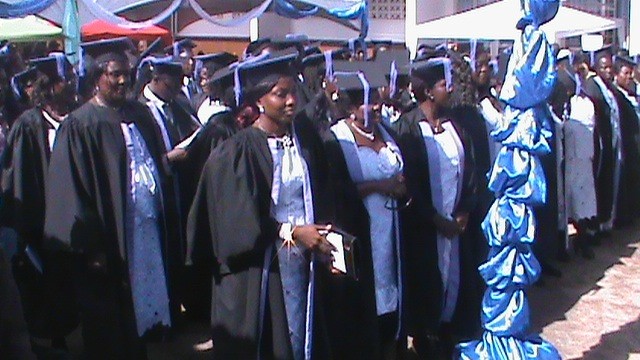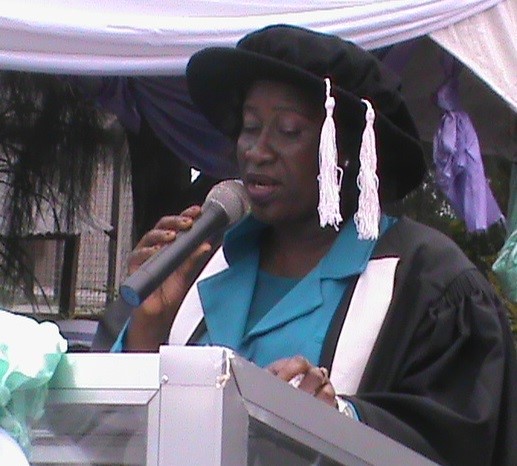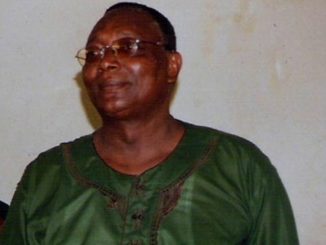
Makeni, Nov. 2, 015 (MOHS) – The School of Midwifery Masuba, Makeni (SOMM) has produced 58 certified trained and qualified Midwives graduated from the school on October 31, 2015 to join the fight against maternal and newborn mortality.
The newly certified Midwives making their pledge after the commissioning ceremony
The maternal and newborn ‘soldier’ would be deployed in rural communities where there are growing challenges in the fight to reduce maternal and newborn deaths in the country. The school which was established in January 2010 has a traditional annual intake for two years training programme for both the public and private sectors. The school has trained over 400 since its inception.
Head of School, Mrs. Francess Fornah said the five year old institution has grown in status and stature with limited human resource staffing to making it more viable, and appealed for urgent assistance to put on government payroll 16 staff that are providing sacrificial and patriotic services to the development of the school.
Head of School, Mrs. Francess Fornah
She told the audience that 135 students are currently in training and appealed for the construction of additional staff quarters and hostel accommodation since the present structure accommodates only 35 students.
The School in collaboration with the Directorate of Nursing Services and the Nurses and Midwives Board, Mrs Fornah said was able to review the school’s curriculum to meet with international standards and thanked UNFPA, WHO and the Medical Research Centre (MRU) for their continued support.
To the set four (4) certified midwives, the Head of School encouraged them to adopt an optimistic attitude and to be honest and dedicated workers.
The Chief Nursing Officer, Matron Hossinatu Kanu rated the training of midwives as far back as the early 1560, describing the midwife as a person who has acquired the requisite qualifications to be registered and, or legally licensed to practice midwifery.
She said despite the gains made by the government in the health sector, maternal and child mortality remain what she referred to as intractably high, with 156 per 1,000 and 1165 per 100,000 live births, according to the 2013 Demographic and Health Survey by Statistic Sierra Leone. These poor health indicators, she said are as a result of a range of implementation challenges including the critical shortage of health workers that the country is currently facing, pointing out only 288 midwives with 48 percent serving in Freetown from the UNFPA 2014 Draft Midwifery mapping.
Matron Kanu told her audience that in view of the prevailing situation, government has made a potential commitment to increase the number of midwives from 288 to 1,145 with a view to ensuring that all designated facilities have a minimum number of satisfactory midwives. The Nursing Directorate she said is in the process of developing a policy frame work with strategic direction in support of the 2015-2020 Recovery Plan, and beyond. The Nursing and Midwifery staff comprised more than 70 percent of the total health workforce, and the strategic direction frame work aimed at providing guidance and lead to the nursing and midwifery workforce, opined the Chief Nursing Officer.
She disclosed that there is now provision for nurses and midwives to become Specialists and Consultants in their different disciplines, adding that Nurses and Midwifery Tutors were omitted in the previous scheme of work but have now been included into the scheme.
The other good news disclosed was the change in the nomenclature of Maternal and Child Health Aides and Nursing Aides to Assistants with provision of six months Nursing Assistants training. Plans are also currently underway for capacity building to develop standards for nursing and midwifery education and practice as part of a continuous quality improvement for posterity. The Chief Nursing Officer said.
She encouraged the newly certified midwives to combine their responsibility to managing other staff with ongoing activities, work as a team, and endeavor to carry out research that would help move the profession forward.
The UNFPA Country Representative, Dr. Bannet Ndyanabangi lauded the school for the progress made, and congratulated the midwives for the successful completion of the training. He reiterated UNFPA’s continued commitment and support to the development of midwifery in Sierra Leone.
Making the Keynote address on the theme “Strengthening Quality Midwifery Care”, Deputy Minister of Health and Sanitation 1, Foday Sawi Lahai described the newly certified midwives as foot soldiers and heroines that are produce to provide quality health care for the maternal and newborn.
He noted the constraints and challenges in working in remote areas, inadequate housing, incentives motivation, and the request for additional hostels and staff quarters for the school to strengthen output.
The Ministry of Health and Sanitation, Mr. Sawi Lahai said is in the midst of challenges ranging from logistics, infrastructure and human resource capacity among other key issues, adding that the Ministry in its Post Ebola Recovery Plan is poised to building a resilient health system across the country.
He reminded the audience about the re-emergence of the Ebola with the potential attack on Guinea, describing the situation as a battle to stay zero, and implored Sierra Leoneans to avoid complacency as the Ministry, and partners are working towards ensuring sustainable zero.
Other speakers include the Director, Medical Research Centre (MRC), Mr. Abdul Karim Jalloh, the President, Sierra Leone Midwives Association, Sr. Safiatu Foday and the Chairman for the occasion, Director, Reproductive and Child Health, Ministry of Health and Sanitation, Dr. Santigie Sesay.
Highlights of the ceremony include commissioning and distribution of certificates to the midwives by the Registrar, Nurses and Midwives Board, Mrs. Hannah Coker and Sr. Fatmata Dabo, Senior Tutor, School of Midwifery Masuba, Makeni, and a skit performance by Final Year students.
JAK/KK/MOHS/SLENA



